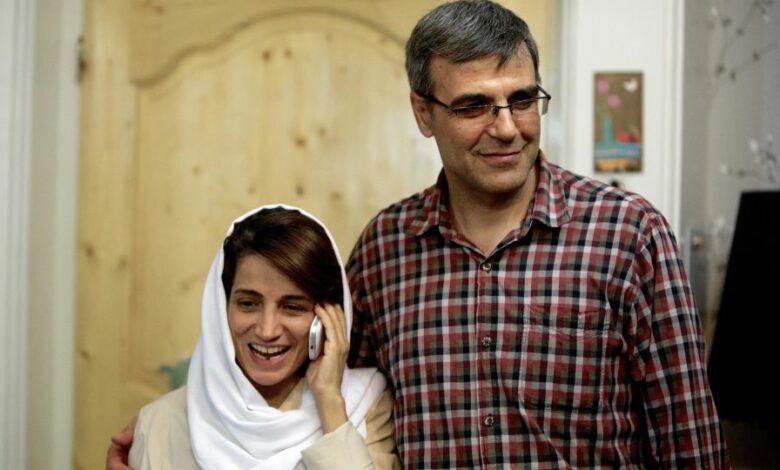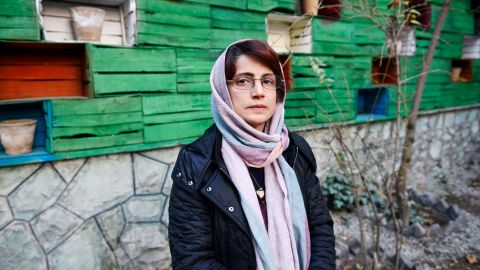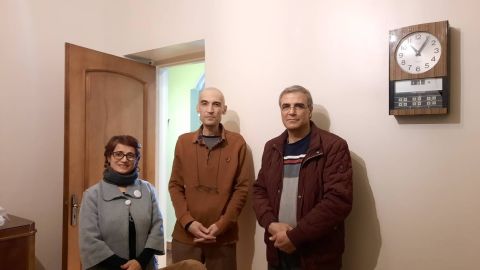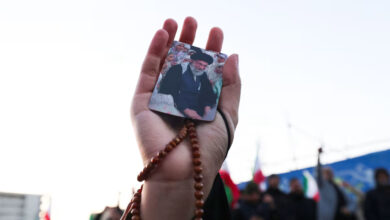
Reza Khandan was summoned to report to the judiciary within 30 days to begin serving out the sentence, which was initially handed down in 2019.
Sotoudeh said her husband’s summons came days before she spoke with CNN’s Christiane Amanpour in an exclusive interview from her home in Tehran, but he hadn’t informed her about the matter.
“I ask for help from all free consciences [around the world] to prove that human solidarity [exists] and to put an end to oppression in order gain basic rights,” Sotoudeh said.
In her interview with Amanpour, Sotoudeh made clear that she and her family know the risks of speaking out publicly.
Though she acknowledged she was “fearful” for her and her family’s safety, she told Amanpour: “I’m also frightened that if I don’t do anything, if I stay passive, that would lead to worsening of the situation.”
Khandan was arrested in 2018 for his activism and for supporting his wife’s fight against Iran’s mandatory hijab laws, according to Iran’s semi-official ISNA news agency.

Khandan’s lawyer, Mohammad Moghimi, said that his client was charged with “gathering and collusion against national security”; “propaganda against the regime”; and “spreading and promoting not wearing hijab.”
Khandan was briefly held in prison before being released under the guardianship of Moghimi in late 2018, according to ISNA. He was then sentenced in 2019 but was not taken into custody to serve the five-year term.
Khandan’s lawyer is expected to go to the prosecutor’s office Sunday to find out if the judiciary plans to make his client serve the remainder of his sentence.
“It’s only natural that all of us, including my children, are worried about the sentence being carried out,” Sotoudeh explained. “If there is any hope left within me that the [judiciary does not] carry out the sentence, it’s because of the solidarity and love for humankind.”

News of Khandan’s summons comes days after his wife spoke exclusively to CNN’s Christiane Amanpour about the recent protests in Iran, political prisoners and the mounting concerns over the health of Sotoudeh’s friend, imprisoned Iranian doctor and civil rights activist Farhad Meysami.
Meysami was jailed in 2018 after voicing his support for women protesting the compulsory hijab law, according to ISNA. The activist was charged with “assembly and collusion to act against national security” and of “propaganda against the regime,” according to Iranian Human Rights Activists News Agency (HRANA).
“For many years, Farhad has been a very active member of our civil society, but for the past 10 years, [his] activism has become more and more open. And he has been especially supporting the women in their protest movement,” Sotoudeh told Amanpour.
Meysami was released from prison last Friday as part of an annual amnesty granted by Iran’s Supreme Leader Ayatollah Khamenei.
But many other activists and protesters remain in custody or at risk of detention.
“Despite the release of dozens of political prisoners, the crackdown continues,” Omid Memarian, a senior Iran analyst at Democracy for the Arab World Now (DAWN) told CNN.
“There are many activists who have been summoned or are expected go to prison to carry out the rest of their suspended sentences.”
Memarian expressed his outrage and disappointment at what he describes as a temporary reprieve for pardoned protesters, who he says will likely be summoned back to prison to serve the rest of their sentences.
“These activists have been asking for women’s freedom, for the freedom to choose what to wear, and have been fighting against the compulsory hijab,” he said.
“Now, by sending Khandan to prison for these activities, it shows us that the government’s approach towards mandatory hijab in reality has not changed. They will continue to criminalize the fight against mandatory hijab and have zero tolerance toward activists who speak out.”




